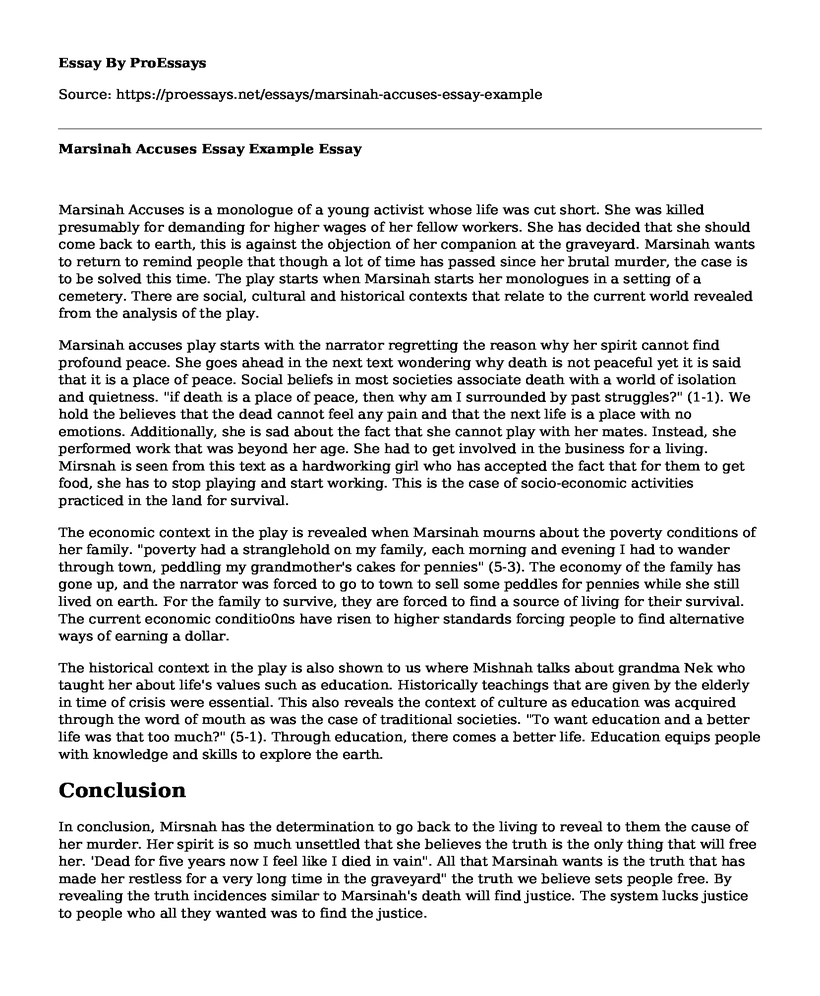Marsinah Accuses is a monologue of a young activist whose life was cut short. She was killed presumably for demanding for higher wages of her fellow workers. She has decided that she should come back to earth, this is against the objection of her companion at the graveyard. Marsinah wants to return to remind people that though a lot of time has passed since her brutal murder, the case is to be solved this time. The play starts when Marsinah starts her monologues in a setting of a cemetery. There are social, cultural and historical contexts that relate to the current world revealed from the analysis of the play.
Marsinah accuses play starts with the narrator regretting the reason why her spirit cannot find profound peace. She goes ahead in the next text wondering why death is not peaceful yet it is said that it is a place of peace. Social beliefs in most societies associate death with a world of isolation and quietness. "if death is a place of peace, then why am I surrounded by past struggles?" (1-1). We hold the believes that the dead cannot feel any pain and that the next life is a place with no emotions. Additionally, she is sad about the fact that she cannot play with her mates. Instead, she performed work that was beyond her age. She had to get involved in the business for a living. Mirsnah is seen from this text as a hardworking girl who has accepted the fact that for them to get food, she has to stop playing and start working. This is the case of socio-economic activities practiced in the land for survival.
The economic context in the play is revealed when Marsinah mourns about the poverty conditions of her family. "poverty had a stranglehold on my family, each morning and evening I had to wander through town, peddling my grandmother's cakes for pennies" (5-3). The economy of the family has gone up, and the narrator was forced to go to town to sell some peddles for pennies while she still lived on earth. For the family to survive, they are forced to find a source of living for their survival. The current economic conditio0ns have risen to higher standards forcing people to find alternative ways of earning a dollar.
The historical context in the play is also shown to us where Mishnah talks about grandma Nek who taught her about life's values such as education. Historically teachings that are given by the elderly in time of crisis were essential. This also reveals the context of culture as education was acquired through the word of mouth as was the case of traditional societies. "To want education and a better life was that too much?" (5-1). Through education, there comes a better life. Education equips people with knowledge and skills to explore the earth.
Conclusion
In conclusion, Mirsnah has the determination to go back to the living to reveal to them the cause of her murder. Her spirit is so much unsettled that she believes the truth is the only thing that will free her. 'Dead for five years now I feel like I died in vain". All that Marsinah wants is the truth that has made her restless for a very long time in the graveyard" the truth we believe sets people free. By revealing the truth incidences similar to Marsinah's death will find justice. The system lucks justice to people who all they wanted was to find the justice.
Cite this page
Marsinah Accuses Essay Example. (2022, Aug 23). Retrieved from https://proessays.net/essays/marsinah-accuses-essay-example
If you are the original author of this essay and no longer wish to have it published on the ProEssays website, please click below to request its removal:
- Measures of Crime: Rape and Assault
- Managing Public Safety Technology Essay
- Nancy vs. RPI Firm Case Study
- Paper Example on Drug Courts: Examining Their Benefits in Today's Society
- Essay Example on Atomic Bombs on Hiroshima and Nagasaki
- Regulatory Takings: A Constitutional Right of Private Property Owners - Essay Sample
- Essay Example on ANA's Stance on Marijuana Use in Healthcare







